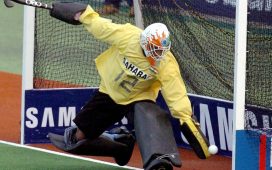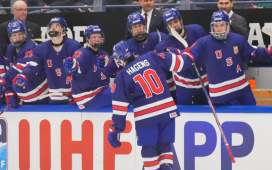Coming off of one of the most team-friendly deals in the NHL, the 29-year-old has inked an eight-year, $72.5-million extension that will make him one of the highest paid defensemen in the league. Could the deal pose problems down the line? Maybe, but the Predators aren’t worrying about that now.

It’s not quite an Erik Karlsson or Drew Doughty-esque eight-figure contract, but come the start of the 2020-21 campaign, Roman Josi will become one of the highest-paid defensemen in the entire NHL.
The Nashville Predators announced Tuesday that they have inked Josi, 29, to an eight-year extension worth a whopping $72.5 million. The new pact, which comes with Josi in the final season of a seven-year, $28-million deal that has long been considered one of the most team-friendly contracts in the league, carries a $9.059-million cap hit, currently set to be the third-highest among all NHL defensemen next season. As of Tuesday, the only rearguards with deals in place for next season with larger cap hits are Karlsson ($11.5 million) and Doughty ($11 million). Some believe St. Louis Blues defenseman and pending unrestricted free agent Alex Pietrangelo could out-earn Josi, particularly if he hits the open market.
Regardless of his cap hit in comparison to others, though, it’s a well-earned pay-hike for Josi, who has been a consistent Norris Trophy contender over the past half-decade – he has two top-five and four top-ten finishes in voting over the past five seasons – and the de facto leader of the Predators’ blueline since the trade that sent former Nashville captain Shea Weber to the Montreal Canadiens. Since Josi’s rise to stardom in 2013-14, a campaign in which he averaged upwards of 26 minutes per outing and had a 40-point breakout season, he has been one of the league’s most prolific offensive blueliners. His 327 points are tied with the Washington Capitals’ John Carlson for the fourth-most among all defensemen since the beginning of the 2013-14 campaign, and Josi’s 25:30 ice-time average is the fifth-highest among all players across that same span.
Of course, whether or not Josi deserves the payday was never really the question. Rather, the bigger concern is what impact paying the premium necessary to retain Josi was going to have on the Predators.
As it pertains to the salary cap, Josi’s extension alone shouldn’t wreak havoc in Nashville or be cause for GM David Poile to start making plans to re-home a handful of his top talents. That’s the benefit of inking a number of players, including wingers Filip Forsberg and Viktor Arvidsson and defenseman Mattias Ekholm (who has arguably unseated Josi as the new king of the cap-friendly blueliner contract), to budget-conscious deals. That said, it does create potential for some roster movement in the not-too-distant future, especially given the boatload of UFAs Nashville will need to retain this off-season.
Though it’s not exactly a pressing concern with the season just begun, next summer the Predators will have several notable roster players eligible to hit the open market, including offensive pieces Mikael Granlund and Craig Smith and defensemen Dan Hamhuis, Yannick Weber and Matt Irwin. And with Josi’s new contract eating up roughly 40 percent of the $22.5 million Nashville was projected to have in cap space next off-season – the Predators are now projected to have in the neighborhood of $13.4 million – it will take some careful maneuvering from Poile and Co. to avoid any potential cap-related pitfalls.
The truth is, though, that Josi’s extension was a clear-cut No. 1 priority for the Predators. That’s why Nashville gave him about everything for which he could have asked. He wanted eight years. He got eight years. He wanted a big payday. He got a big payday. He wanted a full no-movement clause. He got a full no-movement clause. And if he also wanted the best parking spot at the Bridgestone Arena, he probably could have gotten that, as well.
Thus, it now becomes a matter of finding a way to fit the rest of the pieces around the rearguard now that he has put pen to paper. The good news is that many of those are already present. Off-season addition Matt Duchene has been a tremendous fit, Forsberg, Arvidsson and Ryan Ellis are right in the thick of their prime and even Pekka Rinne, in the twilight of his career, has been as solid as ever. Each are excellent talents and ones that have kept Nashville’s window wide open without creating a catastrophic cap situation. Truth be told, with some salary shaving here or there, Nashville should be able to return much of its roster next season and make minor tweaks and tunes where needed.
That’s not to say the contract is all music to Predators’ fans ears, and we can all be honest about the contract and admit that this likely isn’t the best deal for the organization in the long run. But does Nashville really need to consider the long run right now? Sure, in a perfect world, Josi’s extension might have been a four- or five-year pact, a shorter-term proposition that covers what are likely to be the best remaining years of his career before the decline – even if it’s only gradual – sets in. That would have given the Predators the ability to cut ties or negotiate a better rate by the time Josi is entering those late-30s years. And it would have given Nashville the chance to have a touch more salary flexibility or even a wider array of trade options in a few years’ time if they had to shake things up. But risking losing a top rearguard at this moment, when the chance to win now is on the table, due to long-term concerns about the cap situation or overpaying Josi down the line would have been foolish.
So while there may come a time when Predators fans look back on the deal as regrettable or wish the no-movement clause made it easier to ship Josi along should Nashville need something of a roster reset, that angst will be soothed if it comes after a Stanley Cup banner is raised to the rafters. And that is the Predators’ plan: try to win now and deal with the possibility that paying big money to a late-30s defender becomes a problem later. And given the talent-laden roster and open championship window in Nashville, we can’t say it’s a bad one.
Want more in-depth features, analysis and an All-Access pass to the latest content? Subscribe to The Hockey News magazine.








